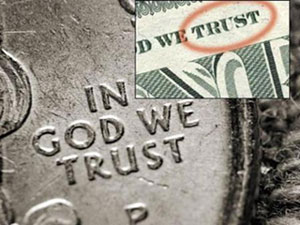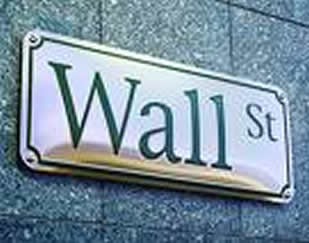Faith and Wealth:
Gospel Lessons, Wall Street Examples
For Sunday September 19, 2010
Lectionary Readings (Revised Common Lectionary, Year C)
Jeremiah 8:18–9:1
Psalm 79:1–9 or Amos 8:4–7
Psalm 113
1 Timothy 2:1–7
Luke 16:1–13
One of my favorite cartoons comes from the Chronicle of Philanthropy (January 25, 1996). It pictures a man who has died standing before the pearly gates. The celestial gatekeeper who sports wings and a halo stares down at the supplicant and advises him, "Charitable giving isn't the ultimate test of one's humanity, but it gives us some numbers to play with."
In the gospel from Luke 16:1–13 for this week, which is one of the craziest stories in the entire Bible, with one of the hardest-hitting punch lines, Jesus says something similar. He says that how we relate to money is an important barometer of how we relate to God. The parable begins with the words, "there was a rich man;" it ends with a stark warning to people who "loved money." The next story in Luke 16:19 begins exactly the same way, "there was a rich man," although it considers wealth from the vantage point of the poor (Lazarus) and not the rich. Jesus didn't hesitate to use money as a yardstick to measure our spiritual health.
 |
"In God we trust" |
Luke's parable sounds crazy because the rich man praises the dishonesty of his money manager, even though he fired him for poor performance. Knowing he would be fired, the money manager cooked the books of his boss's clients to their advantage so that they would owe him favors when he was unemployed. The commendation is directed not toward the manager's dishonesty per se, but for acting shrewdly in regards to what he cared most about (in this case, money), and for averting a future catastrophe.
Jesus then continues the story by drawing a parallel to the effect that if worldly people are so shrewd in regards to something as "insignificant" as money (note Jesus's irony), should not believers be even more shrewd about the "true riches" of life in the kingdom of God? Then, in a final twist, Jesus joins the two strands and concludes with a stark warning: "No servant can serve two masters. Either he will hate the one and love the other, or he will be devoted to the one and despise the other. You cannot serve both God and Money" (Luke 16:13).
The story could have ended there, but Luke then includes the audience response. "The Pharisees, who loved money, heard all this and were sneering at Jesus." That Jesus characterizes the Pharisees as "lovers of money" is revealing, because by outward standards they were the most religiously scrupulous and zealous people of their day. They fasted, tithed and observed the Sabbath with impeccable rigor. It's possible to be very religious and yet a "lover of money."
Their deeper problem with money, said Jesus, revealed itself in a subtle but telling trait — self-justification: "You are the ones who justify yourselves in the eyes of men, but God knows your heart. What is highly valued among men is detestable in God's sight." However much the Pharisees related to money with a sort of external religious righteousness, their self-justification indicated that something deeper, something more corrosive and pernicious, infected their hearts. They "highly valued" money; it was their "master" whom they loved and served, whereas in the upside down kingdom of God Jesus suggests that at best money is insignificant, and at worst it is "highly detestable" (16:15).
Two other texts for this week connect wealth and discipleship, but they do so from the perspective of the poor rather than the rich. Amos 8:4–7 and Psalm 113 both speak of the poor, the needy and the barren. How we treat money and how we treat the poor are two sides of the same coin. The psalmist describes the high and mighty God as one who nevertheless "stoops down" from the heavens to tenderly care for the poor. He longs to "raise the poor from the dust, and lift the needy from the ash heap." He would reverse their fortunes, and "seat them with princes" (Psalm 113:5–8).
The poor can be poor for many reasons — laziness, sickness, poor skills, bad luck, economic downturns, lack of educational opportunity, and so on. But Amos employs extraordinarily graphic and harsh language to remind us that some people are poor because rich people exploit them:
Hear this, you who trample the needy
and do away with the poor of the land,
Saying,
"When will the New Moon be over that we may sell grain,
and the Sabbath ended that we may market wheat?" —
skimping the measure, boosting the price, and cheating with dishonest scales,
buying the poor with silver and the needy for a pair of sandals,
selling even the sweepings with the wheat.
This text becomes all the more powerful when we remember how often the rich blame the poor for their misfortune, when in fact Amos says that it's the rich who "trample" the needy.
 |
"Wall Street" sign. |
This past summer I read Michael Lewis's bestseller about the 2008 collapse of the financial markets, The Big Short; Inside the Doomsday Machine (2010). If Amos had written today, he could have included parts of the book in his prophecy. I still don't understand interest rate swaps, mezzanine collateralized debt obligations, or credit default swaps. But according to Lewis, that's exactly how the rich Wall Streeters wanted it.
"No ordinary human being," writes Lewis, "had ever heard of these credit default swaps or, if the people behind them had their way, ever would. By design they were arcane, opaque, illiquid, and thus conveniently difficult for anyone except their creators to price" (201). Because of deliberate non-disclosure, accounting fraud, and hiding risk in complexity, "hardly anyone could understand a subprime mortgage-backed collateral debt obligation" (155) — not the clueless ratings agencies Moody's and S&P, not the hapless SEC, not investors, not Ben Bernanke, and not (to take only one example) Bank of America CEO Ken Lewis.
Credit default swaps fed upon the subprime mortgage boom, which made it possible for a Las Vegas stripper to own five investment properties, or for a strawberry picker with an income of $14,000 a year to buy a $724,000 house (97). These mortgages to people "one broken refrigerator from default" (169), many of which required no proof of employment, income, or money down, were designed to fail, says Lewis, so that the poor borrowers were forced to re-finance with even riskier loans from the rich banks. Subprime mortgages with floating rates eventually comprised about 80% of mortgages. In the end, we the tax payers paid when the stripper and the strawberry picker defaulted on their loans. We also bailed out the Wall Street executives who still "earned" tens of millions for their "work."
But not all the news on Wall Street is bad. A wonderfully positive story has emerged that could easily be part of the Luke 16 parable in which "the people of this world are more shrewd in dealing with their own kind than are the people of the light" (Luke 16:8). On June 16, 2010 Warren Buffett published a letter in which he pledged to give away 99% of his wealth to charity. The letter also announced his collaboration with Bill Gates to challenge some of the wealthiest people in the world to pledge half their wealth to charity. Their challenge was explained in a follow-up article. After making about eighty phone calls, some forty people have said yes to their appeal.
I've been wondering and asking my friends: where is our Luke 16, specifically Christian version of the Buffett challenge? So far, no one has any answers.
Image credits: (1) Horizon.my and (2) ThePastor@Yahoo.





